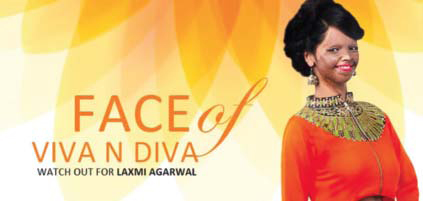 An acid-attack survivor in India has been made a model for a fashion brand, drawing attention to the crime in the country with one of the highest rates of acid violence in the world. Laxmi, who goes by one name, features in an advertising campaign for a new range of apparel from Viva N Diva in an initiative the company said is aimed at raising awareness of those who have lost their physical beauty to acid attacks.
An acid-attack survivor in India has been made a model for a fashion brand, drawing attention to the crime in the country with one of the highest rates of acid violence in the world. Laxmi, who goes by one name, features in an advertising campaign for a new range of apparel from Viva N Diva in an initiative the company said is aimed at raising awareness of those who have lost their physical beauty to acid attacks.
A video clip titled ‘Face of Courage’ shows Laxmi being made up and then striding down the catwalk while smiling at the cameras, her scarred face in focus. “We had seen some pictures of other acid-attack survivors, and we thought, if we can create an opportunity for even one of them, it would be worthwhile,” said Manan Shah, managing director at Viva N Diva in Surat, in the western state of Gujarat. “We have received a very good response and we hope other companies will follow the example.” Globally, there are as many as 1,500 recorded acid attacks every year, with more than 1,000 cases estimated to occur in India alone.
However, many attacks go unreported because victims are too afraid of reprisals to come forward. Attackers frequently target the head and face to maim, disfigure and blind the victims. Despite the severity of the crime, acid remains easily available in India, where it is used in the manufacture and processing of cotton and rubber, even after a 2013 Supreme Court order to curb sales.
Last year, the court ruled that victims should receive free medical treatment and a minimum compensation of 300,000 rupees ($4,500). Laxmi, who was 15 when she was attacked by a 32-year-old man whose advances she had spurned, has petitioned the court for a complete ban on the sale of acid. She received an International Women of Courage Award from US First Lady Michelle Obama in 2014. “We want to bring acid-attack survivors into the mainstream world, and this campaign shows it is possible,” said Alok Dixit with the Chhanv Foundation in New Delhi, which has led a campaign to stop acid attacks. “It shows even survivors can be seen as normal.” — Reuters









